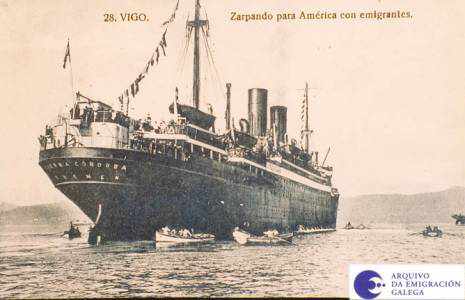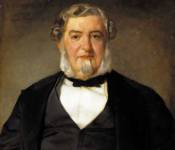
Author: Eduardo Freire Canosa
(University of Toronto Alumnus)
I grant the translations herein to the public domain

(En Las Orillas Del Sar, 1884)
Translator's Notes
The odd insertion of two dotted lines between 2.26 and 2.27 suggests some type of censorship. It is suggested that the expunged verses condemned the existing, unjust social order, and this assertion is buttressed by a poem that De Castro wrote in praise of writer, lawyer and politician Salustiano Olózaga on the occasion of his visit to Santiago de Compostela. Member of the Progressive Liberal Party, inveterate opponent of absolute monarchy, Olózaga was arrested and exiled several times. He took part in the Revolution of 1868 and presided over the commission charged with drafting a new Constitution (1869). This document gave men older than twenty-five the right to vote, restricted the power of the monarch, ceded executive power to an elected government, legislative power to a House of Congress and Senate, and instituted freedom of worship. The absolute monarchy returned in 1874.
Here is an excerpt of the poem penned by De Castro, published in a liberal Madrid newspaper, and rescued from oblivion by Prof. Francisco Rodríguez Sánchez.

To Mr. Salustiano Olózaga (Al señor Salustiano Olózaga)
(La Soberanía Nacional. Monday June 4, 1866)
|
Al escucharos, mi pecho
Sentí lo que siente el alma
Y bien, señor, la fortuna
¿Callarme?...no, aunque quisisera, |
My breast stirred deep inside
I felt what the soul feels
And so, sir, fate desires that today
Keep silent, I? Not even if I wished to, |
Explanation of some words, terms or expressions
Of transparent lymph (2.3). According to the Royal Spanish Academy "lymph" is in Spanish poetry a substitute term for water. "Linfa." http://lema.rae.es/drae/, def. 4, retrieved 26 October 2013.
And on every old bulwark...And played restlessly (2.5-7). During the Middle Ages many villages and hamlets were built near a watchtower or a castle. When these strongholds fell into disrepair they became the unintended playground of children. An example of such medieval fortresses can be seen in Moeche and Narahío, Vimianzo and Brión in the province of A Coruña.
Dios mío (2.26). Literally, "my God," an expression that connotes surprise in English. It is better translated, "dear Lord," which connotes fatigue.
A synonym was used to translate the second instance of the following words,
Recital
|
|
Maite Lorenzo |
|
I
Bien sabe Dios que siempre me arrancan tristes lágrimas
Jamás del extranjero el pobre cuerpo inerte, II
Volved, que os aseguro |
I
Well doth God know that those who leave us
The unfortunate, lifeless body of the foreigner II
Return, for I assure you |
| Return To Home Page |